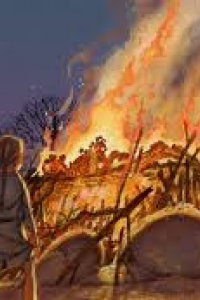
It was not monsoon in Bengal. But still it was drizzling continuously for a long time. Reshma was watching this untimely rain from the balcony. It seemed that the dark clouds were striving hard to share all their pain with the whole world.
The trees of the garden were looking fresh in the sudden shower. Some crows were cawing endlessly expressing their discomfort. There were no bangles in Reshma’s drenched hands like the other days. Her face was also not covered in makeup. She was happy that she did not have collyrium in her eyes; she would have looked ugly if it amalgamated with her tears flowing down the cheeks.
Reshma was surprised to touch her wet cheeks. She found it hard to believe that she was actually weeping. It was not meant to happen at all. She hurriedly went into the adjacent room.
It was the day her father died. Reshma had always known her father as a cunning politician submerged in unfathomable lust to gain more power. He was a human being sans humanity. He could do anything to safeguard his political career. Reshma also knew that the unholy nexus between her father and the local goons was more than some figment of imagination of a publicity-seeking journalist.
Reshma tried to remember when she had actually loved her father for the last time. Was it before her parent’s separation or after? She could not recall properly. But some old memories of her girlhood days were wandering to and fro in her restless mind.
She was ruminating about her brother Reek. He was just two years younger to her. So he must be in the ninth grade then. Reek and her mother might be aware about his death as the news channels had already aired this incident with huge coverage.
She was thinking what Reek and her mother were feeling at that moment. Were they able to control their emotions? After the separation of their parents, Reek and Reshma had cried a lot. When everything was distributed between the couple equally, Reek had chosen his mother and Reshma had chosen her father as their legal guardians. Reshma had to repent for her decision afterwards.
The word ‘freedom’ was alien in Reshma’s universe. Sometimes she felt like a fettered bird choked to death in a golden cage. But she did not complain to her father about this. She knew from past experiences that it would result in nothing fruitful.
The friends in her school often passed disrespectful remarks about her father. At first, she used to be angry and protest loudly. But as time passed, she herself started to believe in the rumours. She did not have the courage to talk about this to her father.
Sometimes she wished she could ask him, “Papa, are my friends telling me the truth?”
Reshma’s father would say in her imagination, “No, dear. What they are saying are all baseless. They are jealous because of my wealth and influence. You should know that the common people always like to believe the rumours about a powerful person. You must not pay heed to them.”
Then Reshma would hug her father tightly. He would embrace her affectionately and kiss her forehead.
Reshma’s imagination did not find a ground in reality. One day she had overheard her father giving instructions to his ‘men’ to kill a leader of the opposition party in a closed-door meeting. After two days, Reshma got the news regarding the mysterious death of that leader from a leading daily.
When Reshma’s father died of a massive heart attack that day, she did not feel the urge to shed tears. There were many little known and unknown relatives present in her house to do the noble act of crying bitterly. An unknown aunt tried to show her solidarity by weeping hysterically almost squeezing her; Reshma had a tough time to set herself free and escape from the scene.
Reshma once again took the red diary that was lying in a corner of her bed. It was very old and full of rusty pages. She had got it from a stack of old objects when her father’s acquaintances were searching for his life insurance policy for Reshma’s future use.
The diary was written by Reshma’s father. She was astonished to see his fantastic handwriting that was glistening like a wreath of pearls even after so many years.
Most of the topics in the diary were about her father’s personal life. It was full of useless narrations like how he had first met her mother in a bus stop, which teacher in his college had the hottest temperament and so on.
Reshma would need some time to read the whole diary. She did not know if there were more diaries hidden in various corners of her house. But she was certain that the diary was having an impact on her mind judging by the teardrop gleaming in a corner of her eye. In a few moments, it would drench her soft cheeks once again.
The diary had some short poems scribbled here and there. She did not know about their standards, but it seemed that they had been penned with utmost care and overflowing emotions. There were some maxims of various great people and holy texts in between his own writing. The quotes began with Ernest Hemingway’s ‘There is no friend as loyal as a book’ and ended with Mao Tse Tung’s ‘To read too many books is harmful’. Rehma was also sure that her father had not used it on a regular basis.
There was a cutting of a newspaper stuck to a page. It contained a smiling picture of her father in his younger days. He was looking very cute with a bandage on his head. ‘Police Beat Students Mercilessly’, read the caption printed beneath the picture. Reshma read the news attentively. The columnist had described how her father had received a serious injury while trying to save one of his friends.
Reshma understood that the author of this diary had died much before her father. All of her tears were only for that young, selfless student.
Reshma could hear the dialogue from Christopher Nolan’s The Dark Knight, in her imagination: ‘Either you die a hero or you live long enough to see yourself become the villain’.
About the Author






Comments